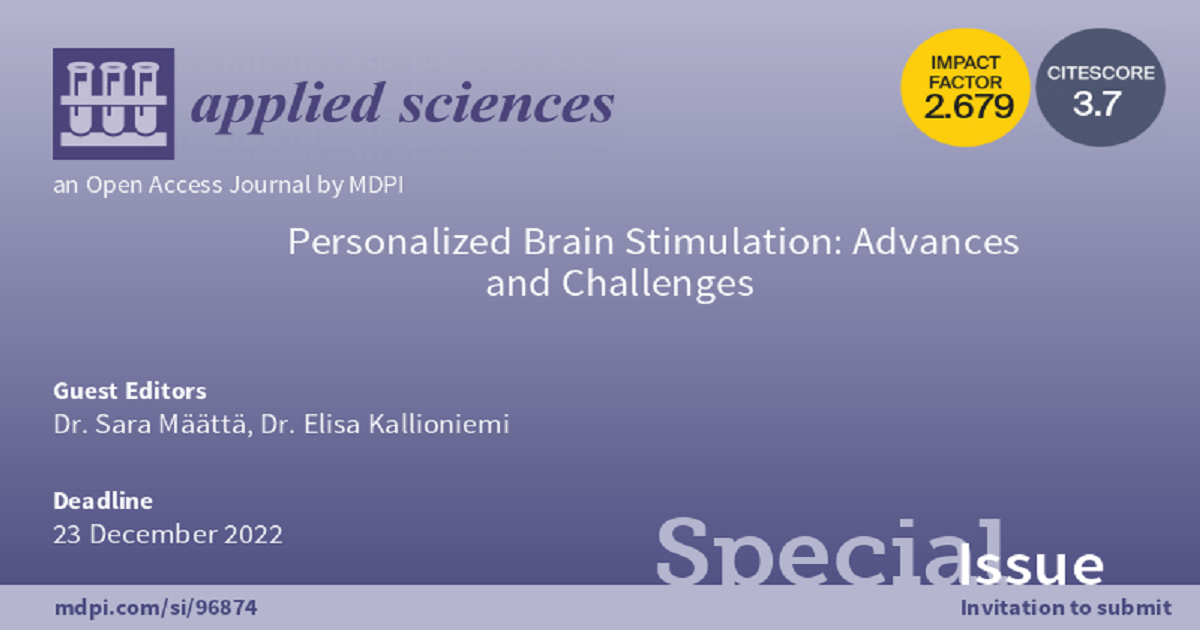- 2.5Impact Factor
- 5.5CiteScore
- 17 daysTime to First Decision
Personalized Brain Stimulation: Advances and Challenges
This special issue belongs to the section “Applied Neuroscience and Neural Engineering“.
Special Issue Information
Dear Colleagues,
This Special Issue is devoted to the personalized applications of brain stimulation, including transcranial magnetic stimulation, repetitive transcranial magnetic stimulation, magnetic seizure therapy, electroconvulsive therapy, transcranial electrical stimulation, deep brain stimulation, photobiomodulation, vagus nerve stimulation, and ultrasound stimulation. Each article should include discussion on the advances or challenges associated with personalizing the application. Both therapeutic and non-therapeutic applications and original research, non-experimental studies (method/technology development), case reports, and critical reviews are welcome. The authors should demonstrate that brain stimulation is somehow personalized to the neural characteristics of the study participants, either based on baseline or online measurement or on other factors, such as sex, age, pathology, etc. As in some brain stimulation applications, such as transcranial magnetic stimulation, conventional applications already personalize the stimulation to excitability threshold; this Special Issue seeks novel approaches beyond these well-established protocols. Studies showing the need/lack of need for personalized applications, i.e., those showing that the study participants react differently/similarly to brain stimulation, are also welcome. Potential topics in non-experimental studies include but are not limited to methods and technology that could facilitate personalizing brain stimulation applications and simulations and mathematical models that provide a theoretical framework for personalizing applications.
Dr. Sara Määttä
Dr. Elisa Kallioniemi
Guest Editors
Manuscript Submission Information
Manuscripts should be submitted online at www.mdpi.com by registering and logging in to this website. Once you are registered, click here to go to the submission form. Manuscripts can be submitted until the deadline. All submissions that pass pre-check are peer-reviewed. Accepted papers will be published continuously in the journal (as soon as accepted) and will be listed together on the special issue website. Research articles, review articles as well as short communications are invited. For planned papers, a title and short abstract (about 250 words) can be sent to the Editorial Office for assessment.
Submitted manuscripts should not have been published previously, nor be under consideration for publication elsewhere (except conference proceedings papers). All manuscripts are thoroughly refereed through a single-blind peer-review process. A guide for authors and other relevant information for submission of manuscripts is available on the Instructions for Authors page. Applied Sciences is an international peer-reviewed open access semimonthly journal published by MDPI.
Please visit the Instructions for Authors page before submitting a manuscript. The Article Processing Charge (APC) for publication in this open access journal is 2400 CHF (Swiss Francs). Submitted papers should be well formatted and use good English. Authors may use MDPI's English editing service prior to publication or during author revisions.

Benefits of Publishing in a Special Issue
- Ease of navigation: Grouping papers by topic helps scholars navigate broad scope journals more efficiently.
- Greater discoverability: Special Issues support the reach and impact of scientific research. Articles in Special Issues are more discoverable and cited more frequently.
- Expansion of research network: Special Issues facilitate connections among authors, fostering scientific collaborations.
- External promotion: Articles in Special Issues are often promoted through the journal's social media, increasing their visibility.
- e-Book format: Special Issues with more than 10 articles can be published as dedicated e-books, ensuring wide and rapid dissemination.

